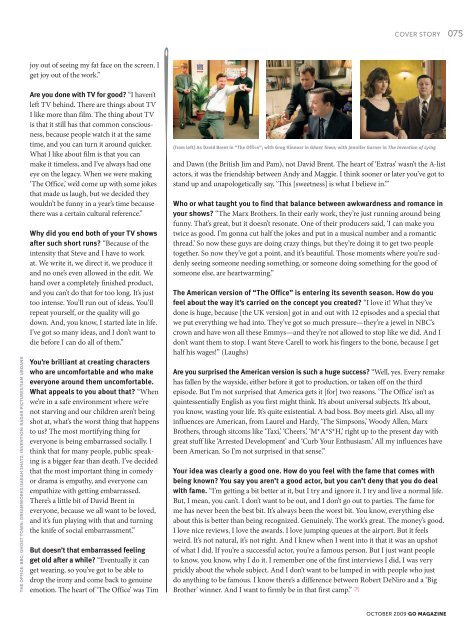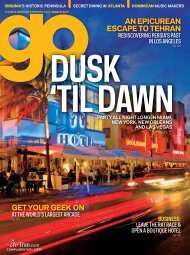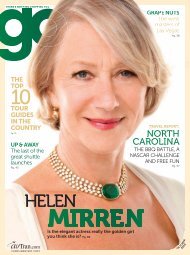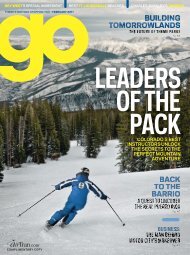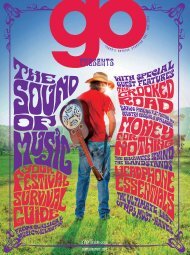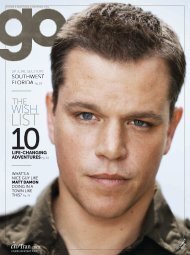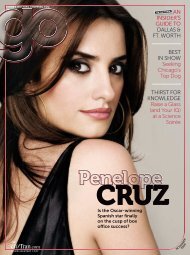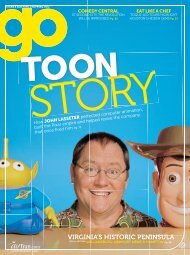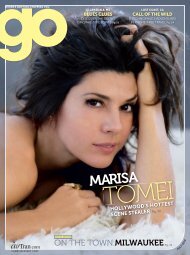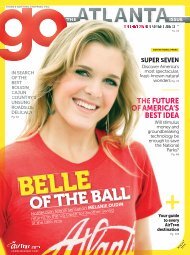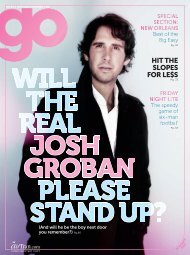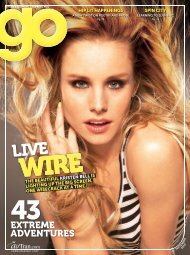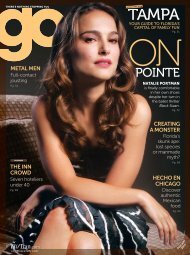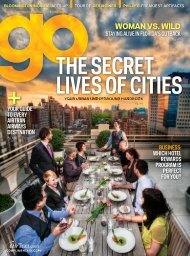You also want an ePaper? Increase the reach of your titles
YUMPU automatically turns print PDFs into web optimized ePapers that Google loves.
THE OFFICE: BBC; GHOST TOWN: DREAMWORKS/SARAH SHATZ; INVENTION: RADAR PICTURES/SAM URDANK<br />
joy out of seeing my fat face on the screen. I<br />
get joy out of the work.”<br />
Are you done with TV for good? “I haven’t<br />
left TV behind. There are things about TV<br />
I like more than film. The thing about TV<br />
is that it still has that common consciousness,<br />
because people watch it at the same<br />
time, and you can turn it around quicker.<br />
What I like about film is that you can<br />
make it timeless, and I’ve always had one<br />
eye on the legacy. When we were making<br />
‘The Office,’ we’d come up with some jokes<br />
that made us laugh, but we decided they<br />
wouldn’t be funny in a year’s time because<br />
there was a certain cultural reference.”<br />
Why did you end both of your TV shows<br />
after such short runs? “Because of the<br />
intensity that Steve and I have to work<br />
at. We write it, we direct it, we produce it<br />
and no one’s even allowed in the edit. We<br />
hand over a completely finished product,<br />
and you can’t do that for too long. It’s just<br />
too intense. You’ll run out of ideas. You’ll<br />
repeat yourself, or the quality will go<br />
down. And, you know, I started late in life.<br />
I’ve got so many ideas, and I don’t want to<br />
die before I can do all of them.”<br />
You’re brilliant at creating characters<br />
who are uncomfortable and who make<br />
everyone around them uncomfortable.<br />
What appeals to you about that? “When<br />
we’re in a safe environment where we’re<br />
not starving and our children aren’t being<br />
shot at, what’s the worst thing that happens<br />
to us? The most mortifying thing for<br />
everyone is being embarrassed socially. I<br />
think that for many people, public speaking<br />
is a bigger fear than death. I’ve decided<br />
that the most important thing in comedy<br />
or drama is empathy, and everyone can<br />
empathize with getting embarrassed.<br />
There’s a little bit of David Brent in<br />
everyone, because we all want to be loved,<br />
and it’s fun playing with that and turning<br />
the knife of social embarrassment.”<br />
But doesn’t that embarrassed feeling<br />
get old after a while? “Eventually it can<br />
get wearing, so you’ve got to be able to<br />
drop the irony and come back to genuine<br />
emotion. The heart of ‘The Office’ was Tim<br />
COVER STORY<br />
(from left) As David Brent in “The Office”; with Greg Kinnear in Ghost Town; with Jennifer Garner in The Invention of Lying<br />
and Dawn (the British Jim and Pam), not David Brent. The heart of ‘Extras’ wasn’t the A-list<br />
actors, it was the friendship between Andy and Maggie. I think sooner or later you’ve got to<br />
stand up and unapologetically say, ‘This [sweetness] is what I believe in.’”<br />
Who or what taught you to find that balance between awkwardness and romance in<br />
your shows? “The Marx Brothers. In their early work, they’re just running around being<br />
funny. That’s great, but it doesn’t resonate. One of their producers said, ‘I can make you<br />
twice as good. I’m gonna cut half the jokes and put in a musical number and a romantic<br />
thread.’ So now these guys are doing crazy things, but they’re doing it to get two people<br />
together. So now they’ve got a point, and it’s beautiful. Those moments where you’re suddenly<br />
seeing someone needing something, or someone doing something for the good of<br />
someone else, are heartwarming.”<br />
The American version of “The Office” is entering its seventh season. How do you<br />
feel about the way it’s carried on the concept you created? “I love it! What they’ve<br />
done is huge, because [the UK version] got in and out with 12 episodes and a special that<br />
we put everything we had into. They’ve got so much pressure—they’re a jewel in NBC’s<br />
crown and have won all these Emmys—and they’re not allowed to stop like we did. And I<br />
don’t want them to stop. I want Steve Carell to work his fingers to the bone, because I get<br />
half his wages!” (Laughs)<br />
Are you surprised the American version is such a huge success? “Well, yes. Every remake<br />
has fallen by the wayside, either before it got to production, or taken off on the third<br />
episode. But I’m not surprised that America gets it [for] two reasons. ‘The Office’ isn’t as<br />
quintessentially English as you first might think. It’s about universal subjects. It’s about,<br />
you know, wasting your life. It’s quite existential. A bad boss. Boy meets girl. Also, all my<br />
influences are American, from Laurel and Hardy, ‘The Simpsons,’ Woody Allen, Marx<br />
Brothers, through sitcoms like ‘Taxi,’ ‘Cheers,’ ‘M*A*S*H,’ right up to the present day with<br />
great stuff like ‘Arrested Development’ and ‘Curb Your Enthusiasm.’ All my influences have<br />
been American. So I’m not surprised in that sense.”<br />
Your idea was clearly a good one. How do you feel with the fame that comes with<br />
being known? You say you aren’t a good actor, but you can’t deny that you do deal<br />
with fame. “I’m getting a bit better at it, but I try and ignore it. I try and live a normal life.<br />
But, I mean, you can’t. I don’t want to be out, and I don’t go out to parties. The fame for<br />
me has never been the best bit. It’s always been the worst bit. You know, everything else<br />
about this is better than being recognized. Genuinely. The work’s great. The money’s good.<br />
I love nice reviews, I love the awards. I love jumping queues at the airport. But it feels<br />
weird. It’s not natural, it’s not right. And I knew when I went into it that it was an upshot<br />
of what I did. If you’re a successful actor, you’re a famous person. But I just want people<br />
to know, you know, why I do it. I remember one of the first interviews I did, I was very<br />
prickly about the whole subject. And I don’t want to be lumped in with people who just<br />
do anything to be famous. I know there’s a difference between Robert DeNiro and a ‘Big<br />
Brother’ winner. And I want to firmly be in that first camp.”<br />
OCTOBER <strong>2009</strong> GO MAGAZINE<br />
075


